Any RV needs a quality generator for any time you can’t connect to a source of AC power. You’ll need to run your generator if you want to run the microwave or power up your air conditioning unit.
While most generators require gasoline, some run on propane. The most versatile generators out there actually allow you to operate them on either gas or propane. The biggest reason to get a propane generator for RV use is fuel economy.
In most cases, propane tends to be more affordable than gasoline, which ultimately helps you save on long-term fuel costs. But a propane generator can also be useful for extended RV living.
Some RV owners (like myself) will connect their generator to an external propane tank as a more reliable fuel source.
By connecting an external tank to your generator, you can guarantee a reliable power supply without constantly having to move your RV to refill the onboard tank.
In our mission to help you find a propane generator for RV use, we’ve compiled a shortlist of the best generators on the market today.
Our list includes specs and features for each generator so that you can easily find the model that checks all of your boxes. Our thorough Buying Guide outlines the most important criteria for selecting a propane generator.
And finally, the Frequently Asked Questions section is a great resource for some of the most common questions about propane generators.
Our Top 6 RV RV Propane Generator Picks for 2023
There are six models of the best propane generators for RV available in our list. Our search was conducted on finding a perfect propane generator for your RV.
So let’s get right into our reviews of these propane generators, starting with one of the most trusted brands in the generator industry: Onan.
1: Best Overall: Cummins Onan 2500 Watt LP Vapor Generator
There’s a reason why so many RVs and travel trailers come with Onan Generators.
If you’re looking for a RV propane generator from one of the most trusted brands in the industry, check out the Cummins Onan 2500 Watt LP Vapor Generator.
This generator uses a microprocessor control system that makes it much easier for a technician to diagnose issues quickly.
This is a big positive to help you spend less time at the mechanic shop if service is needed on this generator.
But these Onan generators have a reputation of running for years. My 1997 RV still has an operating Onan generator in the back.
For those that don’t like their generator to make a bunch of annoying noise, this model features a fully enclosed design that serves to minimize total sound output.
It also has a single side design so that it can be serviced without removing the entire generator from your RV’s underneath compartment.
Things We Like
Things We Don’t Like
2: Best Budget: ALP 1,000-Watt Propane-Powered RV Generator
One of the most budget-friendly RV propane generators on the market right now is the ALP 1,000-Watt Generator.
While it has a relatively low running wattage, this generator is a good option for anyone that has a limited budget and wants a lightweight generator that runs on propane.
This propane generator weighs only 28 pounds, so it won’t add a bunch of weight to your RV.
You can also choose to use it as a portable generator and simply hook it up to your RV when needed.
This means that you can use this generator for other applications than providing power to your RV, if you so desire.
Using a compatible hose, you can hook this generator up to propane tanks of various sizes.
While you don’t have to go with a tank as large as 120 gallons like I did in the winter of 2019, this generator can run for three hours on a one-pound tank and up to 60 hours on a 20-pound tank.
Another feature that stood out to me about this generator is the fact that it has multiple charging options.
It has a USB port for charging smartphones and other electronics. And it also has two 120-volt AC outlets for charging or powering larger appliances.
RVers that need additional power can hook up two of these generators side-by-side so you have enough wattage to power an RV air conditioning unit.
Things We Like
Things We Don’t Like
3: Best with Electric Start: Champion 3,800-Watt Dual Fuel RV Ready Generator
If you want a generator that can run on either propane or gasoline, look no further than the Champion 3,800-Watt Dual Fuel Generator.
This model gives you the freedom to switch back and forth between two fuel sources, which further improves your fuel economy because you can select the more affordable fuel type at different times.
This generator is actually rated for different starting and running watts depending on which type of fuel you’re using.
It’s rated for 3,800 running watts and up to 4,750 starting watts when running on propane and 3,420 running watts and up to 4,270 starting watts when running on propane.
For those that frequent multiple environments, this generator has a reliable electric start that uses a convenient toggle switch to power a 224cc Champion engine.
The electric start also comes with a battery that has a reasonable lifespan and won’t need to constantly be replaced to keep the starter working.
The last thing that I like about this generator is the included intelligent control panel.
This gauge on this panel displays voltage, hertz, and run-time hours to give you a better idea of the generator’s power output.
It also helps you track maintenance intervals so you can make sure you’re on top of keeping your generator in tip-top shape.
Things We Like
Things We Don’t Like
4: Best For Power and Portability: All Power America 10000 Watt RV Generator
Those searching for an excellent combination of power and portability must spend more time checking out the All Power America APG3590CN propane generator.
This beast is rated to provide 7,500 running watts and up to 10,000 peak watts.
This wattage is plenty to run most RV air conditioning units as well as several smaller appliances.
Although it’s a larger generator with dimensions of 31.69 inches by 21.3 inches by 25.2 inches it comes with a flat-free wheel kit that helps you reposition it if you don’t opt to install it directly underneath your RV.
If you’re running the generator at half-load, it is rated for a run-time up to 8.5 hours. This is largely based on the unit’s 20-pound fuel capacity, which is equivalent to five gallons.
It also features a low oil shut down function that will automatically turn the motor off if the oil level drops below a certain threshold. This can prevent significant engine damage.
I also like that this generator comes with several add-ons. Those add-ons include a meter to measure volts and hours of run-time, a battery, and a propane fuel hose that allows you to hook up the generator to an external fuel tank.
This final ability can really come in handy if you live in a colder environment where you can’t necessarily move your RV every week or so to refill the internal propane tank.
Things We Like
Things We Don’t Like
5: Best For Extended Run Time: Firman H08051 Dual Fuel Portable Generator CARB Certified
If you’re looking for a propane generator that has a good run time when relying solely on its internal fuel tank, look no further than the Firman H08051 propane generator.
In fact, this model has the ability to run on propane or gasoline, which gives you flexibility in an emergency, or simply when one fuel type is significantly more affordable than the other.
It also comes with a built-in eight-gallon fuel tank that allows this generator to run for up to 12 hours on a single tank.
In addition, it comes with a 5.5-foot propane fuel hose so you can hook it up to an external fuel tank when needed.
Unlike some generators that are specifically made to provide 30 amp or 50 amp power, this generator is capable of supplying both.
It provides 8,000 running watts and 10,000 peak watts when running on gasoline. When operating it on propane, it’s rated to supply 7,250 running watts and 9,050 running watts.
I also like that this generator comes with an electric start. This feature tends to make generators easier to start in cold weather and it also means you won’t have to exert extra effort with a crank start.
Things We Like
Things We Don’t Like
6: Best Peak Wattage: DuroMax XP12000EH Electric Start Portable RV Generator
If you’re looking for a propane generator that has a good run time when relying solely on its internal fuel tank, look no further than the Firman H08051 propane generator.
In fact, this model has the ability to run on propane or gasoline, which gives you flexibility in an emergency, or simply when one fuel type is significantly more affordable than the other.
It also comes with a built-in eight-gallon fuel tank that allows this generator to run for up to 12 hours on a single tank.
In addition, it comes with a 5.5-foot propane fuel hose so you can hook it up to an external fuel tank when needed.
Unlike some generators that are specifically made to provide 30 amp or 50 amp power, this generator is capable of supplying both.
It provides 8,000 running watts and 10,000 peak watts when running on gasoline. When operating it on propane, it’s rated to supply 7,250 running watts and 9,050 running watts.
I also like that this generator comes with an electric start. This feature tends to make generators easier to start in cold weather and it also means you won’t have to exert extra effort with a crank start.
Things We Like
Things We Don’t Like
How To Choose A Perfect Propane Generator For Your RV
So there are six great options for a great propane generator for RV use. But now we need to dive into the most important criteria that will help you differentiate between these models and, ultimately, select the generator that’s most suited to your needs.
1: Wattage Ratings
Determining the amount of power you’ll need to run the essential systems of your RV is the first step to choosing the right generator.
Think about the equipment and appliances that you absolutely want to be able to operate if you had to rely on generator power alone.
Some examples of these appliances include the refrigerator, water pump, central heating system, water heater, air conditioning unit, fans, and anything else that you deem essential to living comfortably in your RV.
Somewhere in the owner’s manual of your RV, you should find the wattage ratings for all of your RV’s appliances.
Once you locate these ratings, look more closely at the highest starting or peak wattages of the appliances that draw the most power.
Adding up the starting wattages for your two or three largest appliances will give you a great baseline for how much wattage you’ll need from a generator.
Keep in mind that you probably shouldn’t be operating ALL of your appliances at once, even if you opt for a generator that’s capable of doing so.
2: Portability
If you plan to install a new propane generator in an underneath compartment of your RV, you probably won’t need to worry too much about portability.
In this case, you’ll simply need to make sure the generator you choose will fit into the compartment. You’ll also need to know that the compartment can support the generator’s weight.
But if you plan to use a generator for a stationary RV and maintain the ability to move it around for other purposes, you’ll need to feel comfortable with the generator’s weight and dimensions.
A good feature to look for is a wheel kit that allows you to roll a heavier generator rather than lifting it.
Smaller units should always come with handles but, if they don’t, this is an immediate red flag that it’ll make your life more difficult than necessary when trying to move it around.
Just consider how far and often you’ll need to move the generator while you’re evaluating how heavy and large it is.
3: Versatility
It’s always good to evaluate whether a generator can be useful for a variety of purposes.
This can include features like dual-fuel capability, portability, and the ability to supply multiple different power connections.
For example, some generators are capable of supplying both 30 amp and 50 amp power connections.
This can be useful if you currently have a 30 amp RV but you think you might upgrade to a larger RV with a 50 amp connection in the future.
The opposite, of course, can be true for anyone that anticipates downsizing their RV in the future.
A smaller propane generator can also be more versatile because you’ll be able to use it for more applications that just supplying power to your RV.
You might find it useful for tailgating, hunting, or supplying extra power during a backyard party.
Before you settle on a specific generator, make sure it’ll be versatile enough to meet all of your needs.
Only you know what those exact needs are (and they’re likely to change!), but it still pays to consider how your generator can, and will, adapt along with your lifestyle.
4: Maintenance
The ease of performing maintenance on a generator is also something to consider before buying.
While the hope is that you’ll treat your generator with enough care that large maintenance issues won’t come up often, there’s always going to regular maintenance that will help extend the life of your generator.
Portable generators are always the easiest to maintain because they’re the easiest to move and you’ll have access to all sides. This allows you to easily diagnose and address maintenance issues if they come up.
If you install a generator in your RV’s underneath compartment, however, maintenance can sometimes become more difficult.
That’s why there are generators specifically made for this type of installation. These generators are designed so that you can access all of the essential areas for maintenance from a single panel.
So, Which Is Best For You?
The beautiful part about RV living (and, indeed, life in general) is that there’s no single right way to do it.
So I’ve taken the time here to suggest some situations that would be most suited to each of the six propane generators I reviewed above.
If you want to put your trust in a generator brand that’s well-known for quality and reliability, look more closely at the Cummins Onan 2500 Watt LP Vapor Generator.
Onan is a well-respected brand in the generator industry and this model is also one of the quieter generators on our list.
When you’re generator shopping on a budget, don’t overlook the features of the ALP 1,000-Watt Generator.
While it supplies a lower overall wattage, this generator offers a parallel capability to boost the overall power it can supply to your RV.
Those that simply want a generator that’s easy to start when you need it most should consider the Champion 3800-Watt Dual Fuel Generator.
It has an electric start that removes the need to worry about a crank start and it can also run on either propane or gasoline, depending on which is more affordable.
The All Power America APG3590CN propane generator is a great choice for RV owners interested in the perfect combination of power and portability.
It supplies ample running and starting watts while retaining the ability to be rolled into a new position every time you want to move it.
If you’re searching for a generator that has a long run time on its own built-in fuel tank, you might consider the Firman H08051 propane generator.
It has an eight-gallon built-in tank that allows for 12 hours of run time and it can also be attached to an external propane tank for longer run time.
Those that simply want to maximize the wattage they’re getting from a propane generator should consider the DuroMax XP12000EH model.
This generator is also an excellent choice for RVs that require a 50 amp power connection.
Frequently Asked Questions
Generators aren’t the most complicated pieces of equipment. But they still take some getting used to. In this section, I’ll answer several common questions to help you choose the right generator and maintain the generator you ultimately choose.
How do I determine my power needs?
The easiest way to determine the wattage needs of your RV is to add up the running wattages and starting wattages of all the appliances in your RV.
To make it easier, you can probably focus just on starting wattage because it will be higher than running wattage.
That being said, it is rare that you’ll be operating ALL of your appliances at once. So if you want to focus on one or two appliances, think about the appliances that you might consider essential to your RV’s operation. Examples include your microwave, air conditioning unit, and refrigerator.
Can these generators work with an external propane tank?
The short answer is yes. But not all of these generators have this functionality, so be sure to check out models individually for a clearer answer.
But a good sign that a generator will work with an external propane tank is when it comes with a length of propane fuel hose made for that purpose.
What is a dual fuel generator?
A dual fuel generator is exactly what it sounds like. It is a generator that is capable of running on two types of fuel, just not at the same time.
You’ll need to select one fuel or the other, and some generators might offer less energy output when running on propane versus when running on gasoline.
Gasoline and propane are the two most common fuel types used by dual-fuel generators, but there are some models out there that will run on diesel fuel.
What are some generator maintenance ‘best practices’?
If your RV is stationary, it’s recommended to run your generator every two weeks or so. At the very least, try to start your generator for a few hours once a month.
Make sure the oil reservoir is filled to the recommended level. Also, check the fuel level and perform a visual inspection to make sure all parts look clean and nothing is out of place.
Conclusion
As someone who has overwintered in an RV in the past, I can tell you from personal experience that it was much more affordable to heat my RV using propane than it was to rely on an electrical heating source.
And, of course, RVers who aren’t on-the-grid don’t even have the option of using a consistent source of AC power for heat.
A generator can be part of everyday life for some RVers. It can also be a fail-safe for those of us living full-time on-the-grid in an RV.
Either way, it’s an essential source of RV power and these propane generators can be a more fuel-efficient method for getting the job done.
I hope you’ve learned something new about getting a propane generator for RV use and I wish you nothing but the best RV travels going forward!

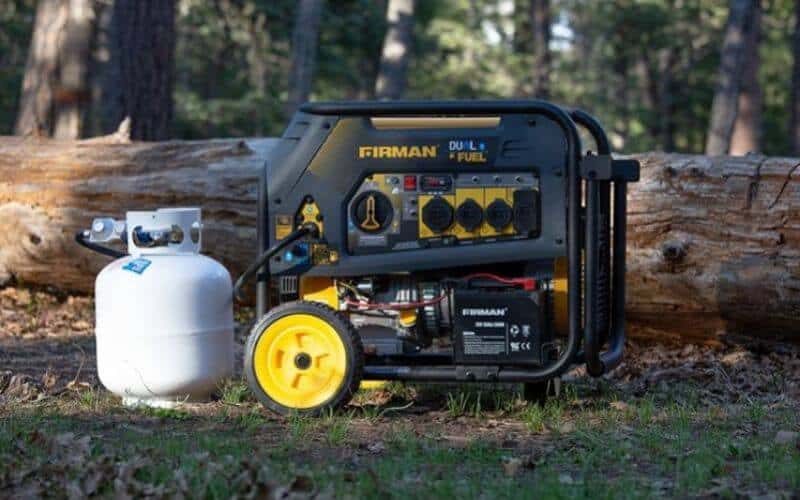
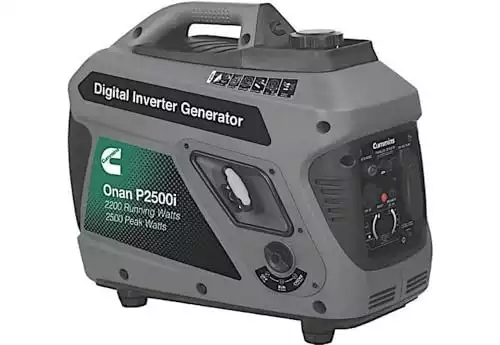

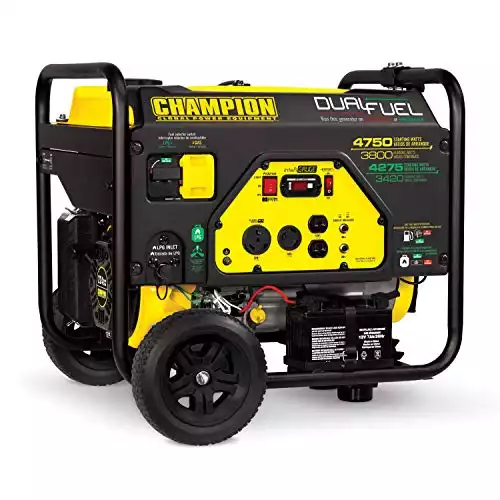
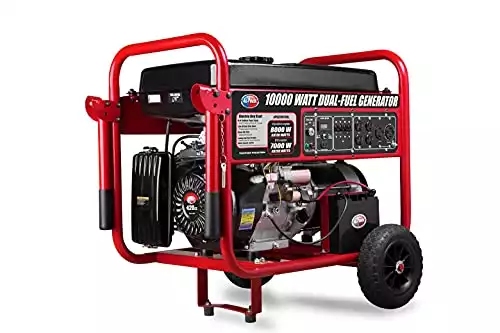
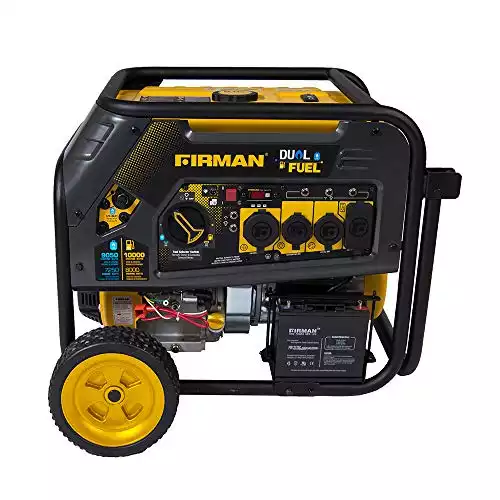
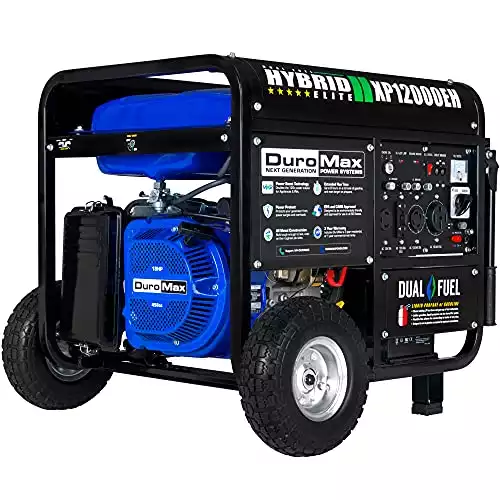
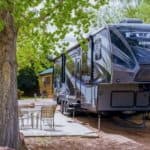
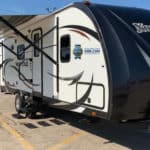

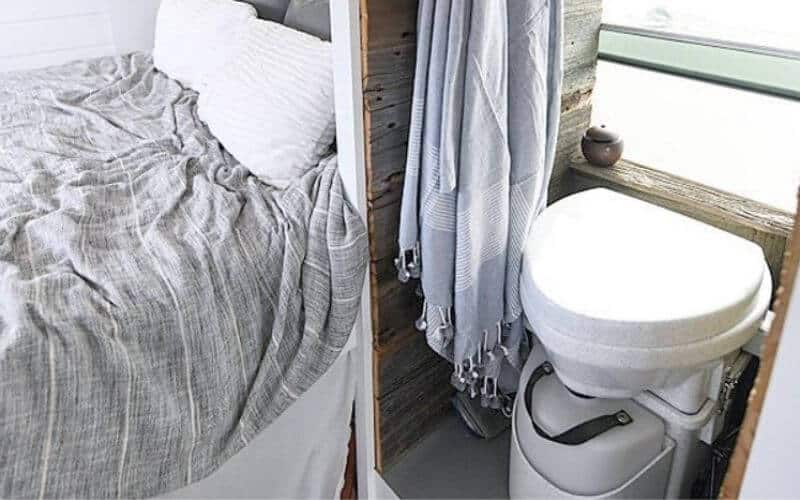

1 Comment
Heather Douglas
2 years agoLove your evaluation. May I reprint it in full in the March/April 2022 edition of Propane Canada giving you full credit? Many thanks.